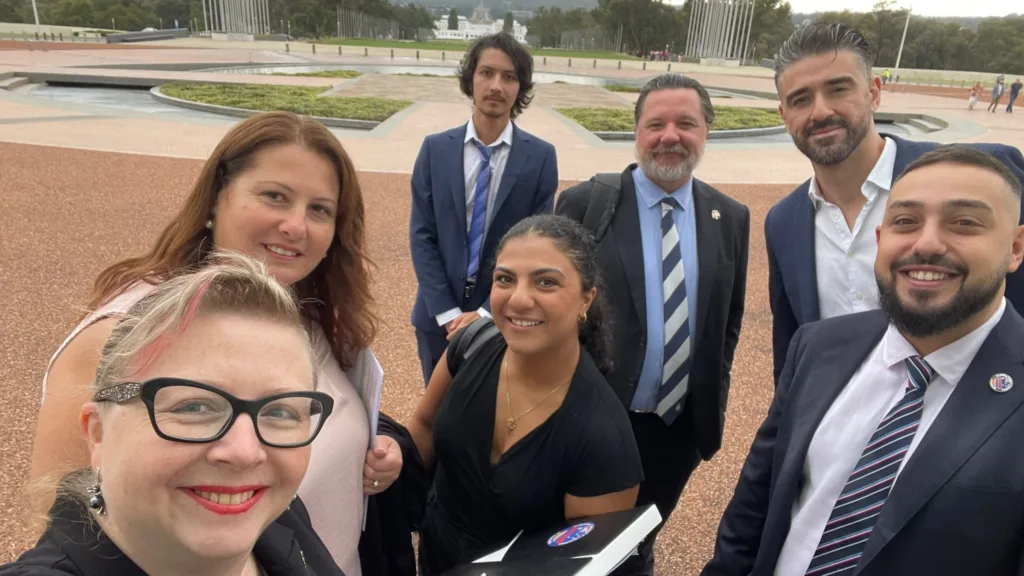By Dr Panayiotis Diamadis*
The united public affairs efforts of the Armenian, Assyrian and Hellenic communities – known as the Joint Justice Initiative – were seen most recently in action during last month’s visit of Ersin Tatar, Ankara’s puppet in the occupied territories of Cyprus. Ankara and Baku are increasing their resources in Australia, partly to combat the effectiveness of the Joint Justice Initiative in promoting the interests of the Australian Armenian, Assyrian and Hellenic communities.
The last days of July each year mark dark anniversaries for Hellenism – 80 years since the destruction of the Jewish communities of Rhodes and the other Dodecanese islands; 50 years since the Turkish invasion of the Republic of Cyprus. Both these catastrophes were caused by ideologies so extreme much of the world has rejected them.
In a move to be applauded, the Cyprus 50th Anniversary Action Group announced its main commemoration will be held on Sunday, July 21 at Federation Square in downtown Melbourne from 2pm. It is anticipated that the commemoration – including flag-raising and wreath laying ceremonies – will be followed by speeches from the Mayor of Melbourne, Victorian and Federal parliamentarians, as well as community and church leaders.
In an attempt to divert attention from the ongoing crimes being perpetrated on the people of Cyprus – occupation, systematic discrimination, illegal settlement, illegal immigration, denial of education, freedom of worship and access to health care to name but a few – certain individuals claiming to represent Turkish Cypriots in Melbourne are organising what they are calling ‘a peace march’ in the streets of central Melbourne ‘to celebrate the 50th Anniversary of Peace in Cyprus’ on Saturday, July 20.

In this country, every person has the right to celebrate or commemorate historic events. In the streets or behind closed doors in community venues. This is not in dispute.
As events since 7 October 2023 have demonstrated, the problem with public protest arises when public fora are used for propaganda and disinformation. According to the organisers of the so-called ‘peace march’, all Cypriots ‘have now undisputedly enjoyed 50 years of peace since’ 1974.
Ankara and Baku are the only states which describe the July 1974 invasion of Cyprus in peaceful terms: thousands were killed; almost 200,000 men, women and children were displaced; over 1,000 people remain missing 50 years later; only a few hundred Christians remain in the Turkish occupied territories of Cyprus, tens of thousands having been driven out since 1974.
This is not peace. Consider why more Turkish Cypriots now live in London than in Cyprus itself.
The violence inflicted by the Nazis on Rhodes and the other Dodecanese islands in July 1944 is no different to the violence inflicted by the Turkish armed forces on Cyprus in July 1974, by the Azeri government on the Armenians of Artsakh since 1988 or by ISIS on the Assyrians since 2014.
This is ethnic cleansing at its most savage. The intention being the destruction of populations the perpetrators considered hostile to them.
In this age of ‘fake news,’ where disinformation is ubiquitous, the work of the Joint Justice Initiative, the Cyprus 50th Anniversary Action Group and similar groups takes on even greater significance. Commemorations are about remembering the past, as guides to better futures. The successes of the Joint Justice Initiative and the assaults of the propaganda machines of Ankara, Baku and other centres illustrate clearly the need for such solidarity.
* Dr Panayiotis Diamadis is from the Australian Institute for Holocaust and Genocide Studies.
